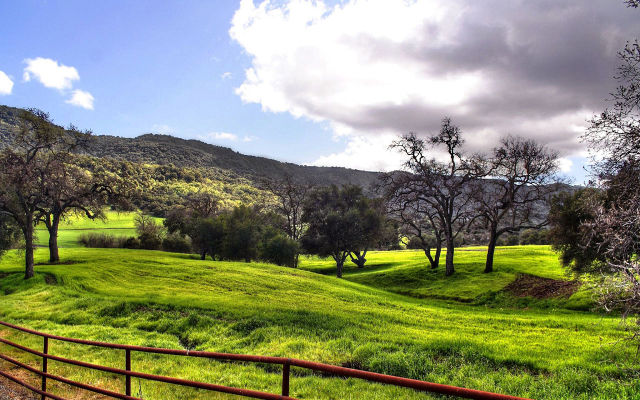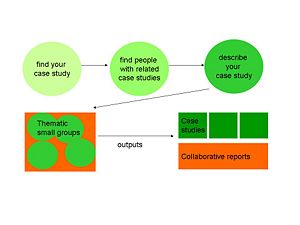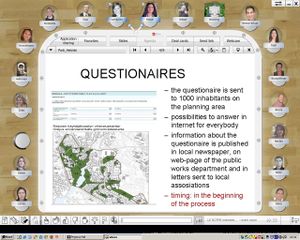Landscape Concepts 2010: Difference between revisions
Heike.kaiser (talk | contribs) |
Heike.kaiser (talk | contribs) m (→Structure) |
||
| Line 29: | Line 29: | ||
'''''for more details, please see:''''' | '''''for more details, please see:''''' | ||
*[http:// | *[http://draco.hfwu.de/~wikienfk5/index.php/Course_Schedule_Seminar_Concepts_of_Landscape_2010 Course Schedule] | ||
*[http://draco.hfwu.de/~wikienfk5/index.php/Minutes_%2B_Recordings_Seminar_Concepts_of_Landscape_2010 Minutes and Recordings] | *[http://draco.hfwu.de/~wikienfk5/index.php/Minutes_%2B_Recordings_Seminar_Concepts_of_Landscape_2010 Minutes and Recordings] | ||
Revision as of 18:14, 6 September 2010
Course Description
International student online‐seminar in Landscape Architecture: Concepts of Landscape
Landscapes are the physical manifestation of manifold forces and processes. Geology and climate shape them as well as changing human uses, regulations and values. In order to be able to develop visions and concepts for future landscapes, we need a well‐grounded understanding of these different forces and their correlation.
This online seminar aims at exploring some of these aspects. The international setting of the seminar will give additional insight in possible cultural similarities and differences of values, approaches and goals of landscapes and their development.
Beside readings and guest lectures about different theories and concepts, the students will analyse the landscape of their university town. All groups will follow the same assignments and format in order to get comparable results and discuss possible similarities and differences.
Learning Objectives
The seminar will add to a critical understanding of crucial aspects of landscape architecture. Along different assignments and interactive tools, the students will practice and enhance their methodological skill set and train communication and team work competences. The specific learning environment offers opportunities for an intercultural exchange with peers.
Structure
- Joint online meetings with guest lectures, interactive tools and student presentations;
- Individual work of teams as well as internationally mixed team work (discussion of readings, case studies and presentations);
- Block I: Theories and Concepts of Landscape 2 online sessions with short student presentations, interactive tools and (guest)lectures
- Block II: Reading the Local Landscape 2,5 online sessions with student presentations
- Block III: Future Landscapes 1,5 online sessions with lecture, short student presentations and discussion
for more details, please see:
Schedule
- 6 online meetings taking place from October 12 - November 23, 2010, Tuesdays from 6.30 - 7.30 p.m. CET in the LE:NOTRE Virtual Team Room
- Your local time? See Time Zone Conversion
- Please make sure to log in at least 10 mins before official starting time for appropriate soundcheck and questions so that we can start the session on time!!
- Optional work before and/or after online meeting time in individual groups.
Assignments
This seminar has a regular scope of 2 ECTS. Participants are expected to attend the plenary sessions on a weekly basis and to collaborate and communicate efficiently in small group work between online seminar sessions. The core assignments are (details will be defined in individual assignments):
- Assignment 1: 3 pictures representing the landscape of the individual university town (short online presentation)
- Assignment 2: documentation and interpretation of transect from town center to edge along video, section, maps, …
- Assignment 3: presentation of “good practice” examples for promising recent approaches in landscape development (internationally mixed teams – comparison of cases from two countries)
Note: Ultimate completion / improvement of all part assignments is expected until January 2011.
Target Group
- The course language is English. Efficient skills in both speaking and writing are presumed.
- Good levels of independence and willingness to work in a group and to use the internet for communication are expected.
Participating Universities:
- Clemson University, USA // Department of Planning and Landscape Architecture – Doris Gstach
- Edinburgh College of Art, UK // School of Landscape Architecture – Simon Bell
- Wageningen University, Netherlands Landscape Architecture Group – Adri van den Brink
- University of Natural Resources and Applied Life Sciences (BOKU) Vienna, Austria // Department of Landscape, Spatial and Infrastructure Sciences - Britta Fuchs
- University of Applied Sciences Nürtingen, Germany // International Master of Landscape Architecture (IMLA) – Ellen Fetzer
- Kassel University, Germany // School of Architecture, Urban Planning and Landscape Architecture – Diedrich Bruns, Heike Kaiser
Additional participants / guests:
- Advanced students of Landscape Architecture and related study fields (third year of Bachelor's program or Master‘s level) of LE:NOTRE/ LE:NOTRE Mundus member universities
- Guests from the professional field are very welcome to join
How to take part?
- Interested students send a letter of intent by e-mail before October 12, 2010 to Ellen Fetzer - email: ellen.fetzer(at)hfwu.de. Later registrations might be considered as well, but students should start in time to keep up with the overall short process.
- Depending on the level of interest, places may be limited. However, one student can act as a contact person for the seminar in case you want to participate as a student group.
Technological Requirements
- stable internet connection (DSL)
- PC or laptop with Windows operating system (or MAC with a different client)
- headset (microphone and earphones)
- registered participants will receive a link to the ViTeRo (Virtual Team Room) Program page for download
How to contribute as a speaker
If you are invited as a speaker in one of the plenary sessions you will be asked to prepare for a 20 - 30 minute presentation in the form of a slideshow (final format: pdf file). Since plenary sessions usually take 90 minutes, presentations are often followed by a moderated discussion (15 mins introduction, 30 mins presentation plus 30 - 45 minutes discussion).
Guidelines for presentations
Please consider the following aspects when you are preparing for a presentation:
- Please avoid written information on the slides except for the most essential statement and questions. As you will be talking synchronously to the audience, there is absolutely no need to add much textual information on the slides.
- Please add many visuals and use the space given. You may not add a number of small images on one slide. Use several slides, each with one image.
- If you have questions to the audience (e.g. at the end in order to stimulate the discussion) you should visualise the question on the slide.
- Please send your presentation in good time to the seminar coordinator (at least two days before the meeting). We then have the chance to propose changes or additions in order to make your presentation more suitable for a virtual classroom setting.
Contact and Organisation
Dipl.-Ing MAsc. Heike Kaiser
University of Kassel // School of Architecture, Urban Planning and Landscape Architecture // Faculty of Landscape Planning / Land Use (Prof. Dr.-Ing. Diedrich Bruns)
email: heike.kaiser@gmail.com


